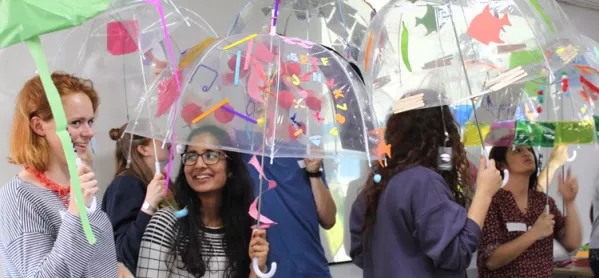The majority of teachers have never received any training on autism, but almost every teacher will encounter autistic students in their classes at some point in their career.
But this situation is set to improve. Earlier in 2016, autism became a mandatory training subject for teachers in England during initial teacher training, thanks to a campaign by the National Autistic Society and Ambitious about Autism.
Although it is not yet clear precisely what this training will look like, we at the Centre for Research in Autism and Education (CRAE) have trialled an engaging workshop for secondary trainee teachers from UCL Institute of Education to get them thinking about life with autism - and especially the sensory differences that are now known to be a core element of autism.
And we did it by using sensory umbrellas.
Sensory sensitivities
Each of us shows differences in our sensory preferences in touch, taste, sound, smell and sight. Some of us love the smell of cut grass, the sight of glittering lights and the touch of fluffy cushions, while others may have an aversion to the taste of tomatoes or the sound of thunder.
These differences are particularly noticeable among children and young people on the autism spectrum. In some cases, sensory information can be enjoyable but, in others, it can be uncomfortable or distressing, especially when unexpected.
Schools, which are often large, noisy and chaotic, can be particularly anxiety-provoking for autistic students. Sometimes, such students can be so overwhelmed that they experience sensory overload - which can induce panic (‘meltdown’) or withdrawal (‘shutdown’).
Practical approaches
So, what does this have to do with umbrellas?
Together with designer, Dr Katie Gaudion, we led a workshop with trainee teachers to help them focus on the senses. To begin, students worked in groups to discuss and explore people’s sensory differences using sensory profiling cards to get an idea of an individual’s sensory preferences and challenges. The groups then swapped their sensory profiles and decorated an umbrella to reflect people’s profiles.
This activity raised two key issues. The first is that none of the decorated umbrellas look the same - just like no two autistic students will look the same. Sensory differences will vary widely from autistic person to autistic person and will also depend on context.
The second is that it is easy to get things wrong - for example, by inadvertently decorating the umbrella with a person’s dislikes. Getting it wrong in this way for an autistic student could have a catastrophic impact on a child’s learning or behaviour.
We know that autistic children and young people have better school experiences if they are educated by teachers who understand their specific needs and build strong connections with them. We must be open to learning about their experiences, listening to them and respecting their differences.
And sometimes, a practical approach can be the best way to help trainee teachers understand these concepts for themselves.
Liz Pellicano is professor of autism education and director of the Centre for Research in Autism and Education (CRAE) at UCL Institute of Education, University College London. You can find more about sensory sensitivities in autism by downloading the CRAE’s free leaflet.
Want to keep up with the latest education news and opinion? Follow TES on Twitter and like TES on Facebook
